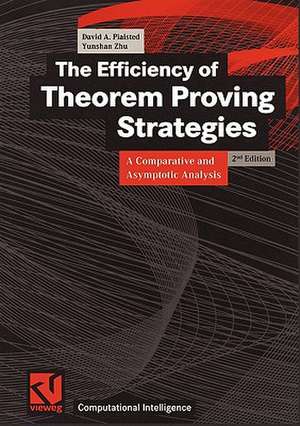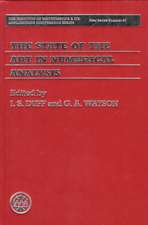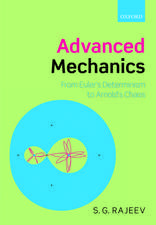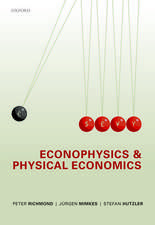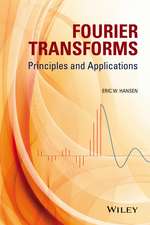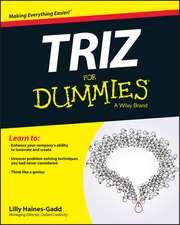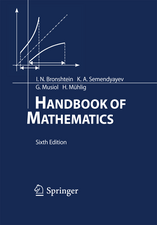The Efficiency of Theorem Proving Strategies: A Comparative and Asymptotic Analysis: Computational Intelligence
Autor David A. Plaisted Wolfgang Bibel Autor Yunshan Zhu Rudolf Kruseen Limba Engleză Paperback – 28 oct 1999
Din seria Computational Intelligence
-
 Preț: 250.66 lei
Preț: 250.66 lei - 20%
 Preț: 225.81 lei
Preț: 225.81 lei - 20%
 Preț: 418.70 lei
Preț: 418.70 lei -
 Preț: 487.48 lei
Preț: 487.48 lei -
 Preț: 318.82 lei
Preț: 318.82 lei -
 Preț: 416.54 lei
Preț: 416.54 lei - 15%
 Preț: 524.79 lei
Preț: 524.79 lei -
 Preț: 488.12 lei
Preț: 488.12 lei -
 Preț: 267.86 lei
Preț: 267.86 lei -
 Preț: 489.69 lei
Preț: 489.69 lei -
 Preț: 463.19 lei
Preț: 463.19 lei - 20%
 Preț: 253.37 lei
Preț: 253.37 lei -
 Preț: 318.82 lei
Preț: 318.82 lei - 20%
 Preț: 276.12 lei
Preț: 276.12 lei - 15%
 Preț: 509.07 lei
Preț: 509.07 lei -
 Preț: 324.43 lei
Preț: 324.43 lei -
 Preț: 435.76 lei
Preț: 435.76 lei - 15%
 Preț: 643.00 lei
Preț: 643.00 lei - 20%
 Preț: 432.79 lei
Preț: 432.79 lei - 20%
 Preț: 322.08 lei
Preț: 322.08 lei - 20%
 Preț: 200.47 lei
Preț: 200.47 lei - 20%
 Preț: 236.68 lei
Preț: 236.68 lei - 20%
 Preț: 326.13 lei
Preț: 326.13 lei
Preț: 326.13 lei
Preț vechi: 407.66 lei
-20% Nou
Puncte Express: 489
Preț estimativ în valută:
62.40€ • 65.15$ • 51.65£
62.40€ • 65.15$ • 51.65£
Carte tipărită la comandă
Livrare economică 04-18 aprilie
Preluare comenzi: 021 569.72.76
Specificații
ISBN-13: 9783528155742
ISBN-10: 3528155744
Pagini: 184
Ilustrații: VIII, 172 p. 3 illus.
Dimensiuni: 148 x 210 x 10 mm
Greutate: 0.25 kg
Ediția:2nd ed. 1999
Editura: Vieweg+Teubner Verlag
Colecția Vieweg+Teubner Verlag
Seria Computational Intelligence
Locul publicării:Wiesbaden, Germany
ISBN-10: 3528155744
Pagini: 184
Ilustrații: VIII, 172 p. 3 illus.
Dimensiuni: 148 x 210 x 10 mm
Greutate: 0.25 kg
Ediția:2nd ed. 1999
Editura: Vieweg+Teubner Verlag
Colecția Vieweg+Teubner Verlag
Seria Computational Intelligence
Locul publicării:Wiesbaden, Germany
Public țintă
ResearchCuprins
1 The Propositional Complexity of First-Order Theorem Proving Strategies.- 2 The First-Order Complexity of First-Order Theorem Proving Strategies.
Notă biografică
David A. Plaisted ist seit 1984 Professor am Fachbereich Informatik der University of North Carolina. Seine gegenwärtigen Forschungen umfassen automatisches Theorembeweisen, Termersetzungssysteme sowie funktionale und Logikprogrammierung.
Yunshan Zhu ist Mitarbeiter am selben Fachbereich der UNC. Sein Forschungsinteresse gilt dem automatischen Theorembeweisen, formalen Methoden und logikbasierten Methoden der Künstlichen Intelligenz.
Since 1984 David A. Plaisted is professor in the Department of Computer Science at the University of North Carolina. His current interests include theorem proving, term-rewriting systems and logic and functional programming.
Yunshan Zhu also is a member of the Department of Computer Science at the University of North Carolina. Zhu's current research interests include theorem proving, formal methods and logical approaches of Artificial Intelligence.
Yunshan Zhu ist Mitarbeiter am selben Fachbereich der UNC. Sein Forschungsinteresse gilt dem automatischen Theorembeweisen, formalen Methoden und logikbasierten Methoden der Künstlichen Intelligenz.
Since 1984 David A. Plaisted is professor in the Department of Computer Science at the University of North Carolina. His current interests include theorem proving, term-rewriting systems and logic and functional programming.
Yunshan Zhu also is a member of the Department of Computer Science at the University of North Carolina. Zhu's current research interests include theorem proving, formal methods and logical approaches of Artificial Intelligence.
Textul de pe ultima copertă
This book is unique in that it gives asymptotic bounds on the sizes of the search spaces generated by many common theorem proving strategies. Thus it permits one to gain a theoretical unterstanding of the efficiencies of many different theorem proving methods. This is a fundamental tool in the comparative study of theorem proving strategies. The second edition is slightly revised, a few errors have been fixed, and some references to related works have been added.
Caracteristici
Theoretical understanding of the efficiencies of many different theorem proving methods
